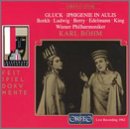| All Artists: Walter Berry, Christoph Willibald Gluck, Karl Böhm, Christa Ludwig, Inge Borkh, Vienna Philharmonic Orchestra, Elisabeth Steiner, James King Title: Iphigenie in Aulis Members Wishing: 1 Total Copies: 0 Label: Orfeo D'or Release Date: 7/9/1996 Genre: Classical Styles: Opera & Classical Vocal, Historical Periods, Classical (c.1770-1830) Number of Discs: 1 SwapaCD Credits: 1 UPC: 789368403820 |
Search - Walter Berry, Christoph Willibald Gluck, Karl Böhm :: Iphigenie in Aulis
 | Walter Berry, Christoph Willibald Gluck, Karl Böhm Iphigenie in Aulis Genre: Classical
|
Larger Image |
CD Details |
CD ReviewsSuperb dramatic performance of "Aulis"! madamemusico | Cincinnati, Ohio USA | 07/12/2004 (5 out of 5 stars) "Christoph Willibald Gluck began his career writing baroque operas in the style of Handel, but around 1775 began writing more strophic, direct, emotionally powerful works based on Greek drama. From this period comes his "Orfeo," "Armide," "Alceste" and "Iphigenie en Tauris."This earlier work, dating from around 1770, is "on the cusp." It was based upon Greek drama but the compositional style was still more Baroque-based, with more formal arias and Baroque coloratura. The Erato recording, conducted by Gardiner, is in this style, which is wholly inadequate for the temper of the drama, even though it is stylistically correct.This 1962 Salzburg production, directed by Gunther Rennert and conducted by Karl Bohm, strove to bring "Aulis" in line dramatically with the second, later Iphigenie opera. To this end, Rennert directed a staging in which a silent chorus of observers watched the drama unfolding onstage, while Bohm consciously sought out singers better known for their dramatic projection than for their ability in Baroque roulades and filigree. The result was a performance in which the niceties of passage-work are sometimes sacrificed but the drama is always at the forefront. This is perhaps most notable in the singing of mezzo Christa Ludwig as Iphigenie; her scales are not terribly fluid, in fact a tad clumsy at times, but her dramatic interpretation is dead-on.Inge Borkh, whose massive voice was never really recorded successfully, nevertheless sings with tender passion as Klytemnestra. Walter Berry, in this his first dramatic (non-Mozartian) role, makes a strong impression as Agamemnon. Tenor James King, who had a large voice yet sometimes tight-sounding top notes, sings well but not always freely as Apollo. But the real star of this show is Bohm, whose conducting is driven by a tremendous inner fire that moves things along at an intense pace. If you like your Greek dramas intense, this is the performance of "Aulis" for you. I can only say that it satisfies me more than any other recording or performance has ever done before or since."
|

 Track Listings (24) - Disc #1
Track Listings (24) - Disc #1